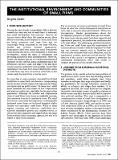Volume 23, Issue 3: Flexible Specialisation: A New View on Small Industry?
Browse by
Recent Submissions
-
Preface
(Institute of Development Studies, 01/07/1992) -
Introduction: Exploring a new Approach to Small?Scale Industry
(Institute of Development Studies, 01/07/1992) -
New Pathways to Industrialisation in Tanzania: Theoretical and Strategic Considerations
(Institute of Development Studies, 01/07/1992)Summary This article discusses the relevance of flexible specialisation in a Tanzanian context. The first section of the article draws together key aspects of the new approach. The second section suggests that a distinction ... -
The Institutional Environment and Communities of Small Firms
(Institute of Development Studies, 01/07/1992)Summary This paper argues that the main problem of small firms in LDCs is not their size but being isolated and powerless. It is not size as such that determines the development potential of small firms, but how they ... -
The Small Enterprise Environment in Zimbabwe: Growing in the Shadow of Large Enterprises
(Institute of Development Studies, 01/07/1992)Summary The article examines how small enterprises compete, cooperate, and specialise on the local level in Zimbabwe. The analytical approach is inspired by flexible specialisation and enterprise network studies in the ... -
Flexible Specialisation and Woodworking Enterprises in Kenya and Zimbabwe
(Institute of Development Studies, 01/07/1992)Summary This article discusses the relevance of the flexible specialisation thesis in the context of existing small and intermediate enterprises. First, the concept is discussed, and a working definition is proposed. ... -
Small Enterprise Flexibility in Sudan
(Institute of Development Studies, 01/07/1992)Summary This article analyses small enterprises in a Sudanese town through the flexible specialisation lens. Deteriorating macro?economic conditions during the 1980s have heightened the inefficiency of large enterprises ... -
The Relevance of the Flexible Specialisation Paradigm for Small?Scale Industrial Restructuring in Ghana
(Institute of Development Studies, 01/07/1992)Summary This article focuses on a large cluster of small enterprises in Kumasi, Ghana. It suggests that the flexible specialisation paradigm only helps to explain the growth of some of the small enterprises, namely a group ... -
Collective Efficiency and Selective Benefits: the Growth of the Rattan Industry of Tegalwangi (Indonesia)
(Institute of Development Studies, 01/07/1992)Summary This article focuses on a cluster of rattan producers in Indonesia. It shows rapid growth of local industry aided by public intervention and based on collective efficiency. However, the benefits of such growth ... -
How Relevant is Flexible Specialisation in Burkina Faso's Informal Sector and the Formal Manufacturing Sector?
(Institute of Development Studies, 01/07/1992)Summary To determine whether flexible specialisation can be found in the informal sector or in the formal industrial sector in Burkina Faso, the term is defined in such a manner that its importance can be assessed. It ... -
Modern Workshop Industry in Mexico: on its way to Collective Efficiency?
(Institute of Development Studies, 01/07/1992)Summary The article uses the example of garment production in a small Mexican town to explore and elaborate on one central concept in the flexible specialisation approach: collective efficiency. Particular weight is put ... -
On the Clustering of Small Firms
(Institute of Development Studies, 01/07/1992)Summary This article is concerned with the viability of small?scale manufacturing in LDCs. Its purpose is to put forward a few categories which may help to disentangle the issue and to suggest a line of research. The ...












